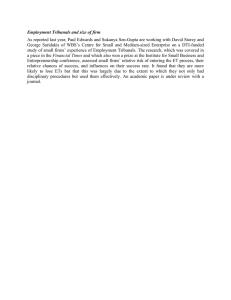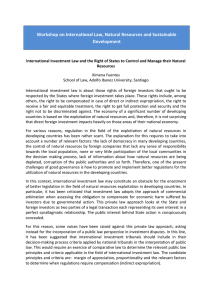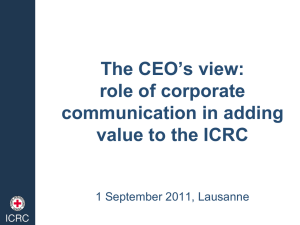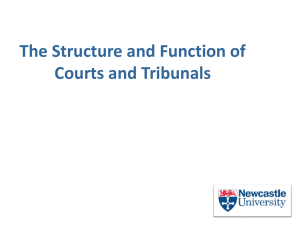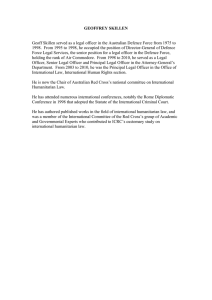War Correspondents and Other Human Rights Workers in Armed Conflict: Are the International Criminal Tribunals Protecting the Requirements of Confidentiality?
advertisement
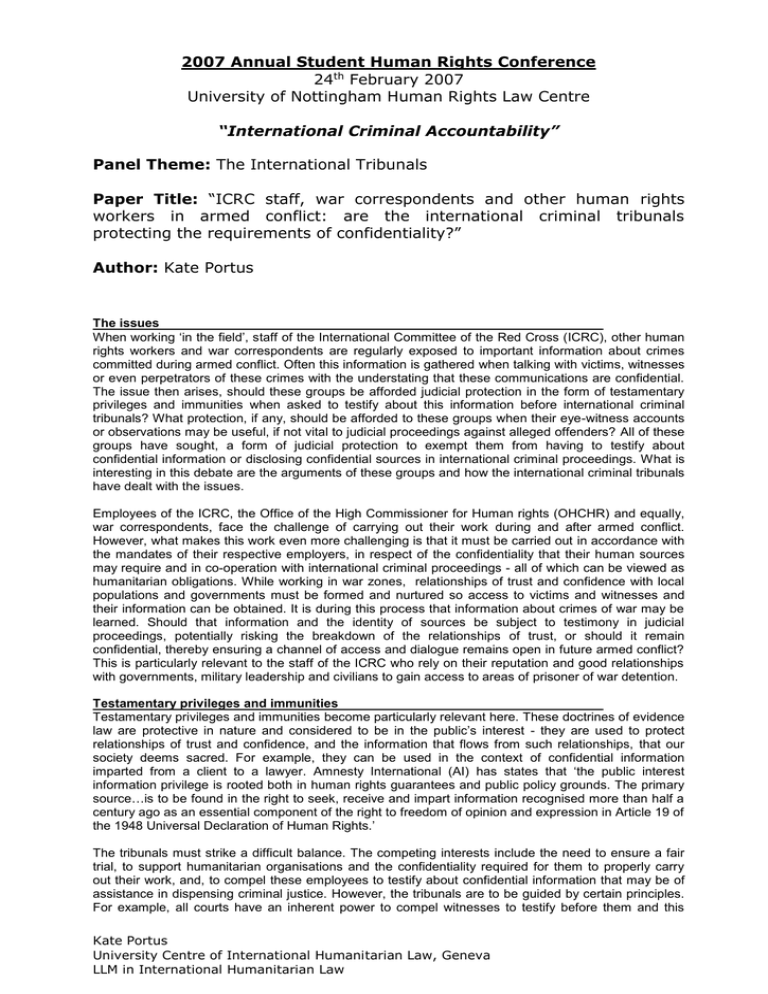
2007 Annual Student Human Rights Conference 24th February 2007 University of Nottingham Human Rights Law Centre “International Criminal Accountability” Panel Theme: The International Tribunals Paper Title: “ICRC staff, war correspondents and other human rights workers in armed conflict: are the international criminal tribunals protecting the requirements of confidentiality?” Author: Kate Portus The issues When working ‘in the field’, staff of the International Committee of the Red Cross (ICRC), other human rights workers and war correspondents are regularly exposed to important information about crimes committed during armed conflict. Often this information is gathered when talking with victims, witnesses or even perpetrators of these crimes with the understating that these communications are confidential. The issue then arises, should these groups be afforded judicial protection in the form of testamentary privileges and immunities when asked to testify about this information before international criminal tribunals? What protection, if any, should be afforded to these groups when their eye-witness accounts or observations may be useful, if not vital to judicial proceedings against alleged offenders? All of these groups have sought, a form of judicial protection to exempt them from having to testify about confidential information or disclosing confidential sources in international criminal proceedings. What is interesting in this debate are the arguments of these groups and how the international criminal tribunals have dealt with the issues. Employees of the ICRC, the Office of the High Commissioner for Human rights (OHCHR) and equally, war correspondents, face the challenge of carrying out their work during and after armed conflict. However, what makes this work even more challenging is that it must be carried out in accordance with the mandates of their respective employers, in respect of the confidentiality that their human sources may require and in co-operation with international criminal proceedings - all of which can be viewed as humanitarian obligations. While working in war zones, relationships of trust and confidence with local populations and governments must be formed and nurtured so access to victims and witnesses and their information can be obtained. It is during this process that information about crimes of war may be learned. Should that information and the identity of sources be subject to testimony in judicial proceedings, potentially risking the breakdown of the relationships of trust, or should it remain confidential, thereby ensuring a channel of access and dialogue remains open in future armed conflict? This is particularly relevant to the staff of the ICRC who rely on their reputation and good relationships with governments, military leadership and civilians to gain access to areas of prisoner of war detention. Testamentary privileges and immunities Testamentary privileges and immunities become particularly relevant here. These doctrines of evidence law are protective in nature and considered to be in the public’s interest - they are used to protect relationships of trust and confidence, and the information that flows from such relationships, that our society deems sacred. For example, they can be used in the context of confidential information imparted from a client to a lawyer. Amnesty International (AI) has states that ‘the public interest information privilege is rooted both in human rights guarantees and public policy grounds. The primary source…is to be found in the right to seek, receive and impart information recognised more than half a century ago as an essential component of the right to freedom of opinion and expression in Article 19 of the 1948 Universal Declaration of Human Rights.’ The tribunals must strike a difficult balance. The competing interests include the need to ensure a fair trial, to support humanitarian organisations and the confidentiality required for them to properly carry out their work, and, to compel these employees to testify about confidential information that may be of assistance in dispensing criminal justice. However, the tribunals are to be guided by certain principles. For example, all courts have an inherent power to compel witnesses to testify before them and this Kate Portus University Centre of International Humanitarian Law, Geneva LLM in International Humanitarian Law power has been provided for in the various constitutive documents of the international tribunals. Yet, when certain exceptions are satisfied, a testamentary privilege or immunity will be afforded to a witness, thereby protecting them from presenting certain evidence or disclosing confidential sources in judicial proceedings. As a result, we are seeing these privileges and immunities being expanded by the international tribunals. The findings The findings with respect to these groups are illustrated through the case law of the tribunals and the following is a short summary. In the case of ICRC staff, the International Criminal Tribunal for the Former Yugoslavia (ICTY) has found that they are to be afforded an absolute immunity from testimony. This finding is based on the unique mandate of the ICRC - the guardian of International Humanitarian Law as stipulated by the Geneva Conventions - which requires it to act as a neutral intermediary between warring parties and to provide humanitarian assistance to those adversely affected by armed conflict. If the organisation cannot guarantee confidentiality in its dealings, the mandate cannot be properly executed. The ICTY also found that the ICRC has an international legal personality, which means it is free carry out its work, immune from criminal proceedings. This is often the case with international organisations. With respect to human rights officers employed by the OHCHR, the Special Court for Sierra Leone found that they are to be afforded a testamentary privilege in some situations. In other words, where a confidential source is at risk of being identified in proceedings that witness will not have to answer questions that will disclose the identity of the source. This finding was based on the fact that as these people are employees of the UN, they are to be encouraged to testify about human rights abuses where there is no risk of exposing a source. Further, it was found that there is significant public interest in the work of these officers and that confidentiality is required so that they may continue to foster trusting relationships with their human sources and in turn prevent human rights abuses in the future. In relation to war correspondents, the ICTY has found that a testamentary privilege is to apply where there is a confidential source or where confidential information is held, except where a two part test is satisfied: 1. the evidence sought is of direct and important value in determining a core issue in the case and 2. the evidence sought cannot reasonably be obtained elsewhere. Again, the reasoning for such a finding was based on the significant public interest in the work of these people, the real concerns for the human sources in this situation – those who risk their safety to speak out about crimes of war - and that the correspondents’ safety would also be jeopardised should they be viewed as beholden to the tribunals. Conclusion What is also relevant here is the right of the accused to a fair trial. What the tribunals have emphasised is that it is important that these measures of judicial protection do not threaten such a right. It seems that this has been appropriately considered in the case law and what must be remembered is that armed conflict is an extenuating circumstance, allowing these tribunals to reach their decisions using a more flexible approach to the application of evidence law than that of their domestic counterparts. To be clear, this is not an opportunity for human rights to be jettisoned, but a situation where many factors must be taken into consideration. Such factors may include ensuring future access for the ICRC which can in turn prevent future human rights abuses in armed conflict, or additionally, ensuring that victims and witnesses of armed conflict can feel secure in coming forward to tell their story to war correspondents to human rights workers which assists in post conflict healing. Thus it is argued that the international criminal tribunals are properly protecting the requirements of confidentiality for these different groups in the context of armed conflict. The judicial protection afforded is based on sound legal reasoning and appropriate consideration of the more pragmatic elements of the situation. Kate Portus University Centre of International Humanitarian Law, Geneva LLM in International Humanitarian Law
